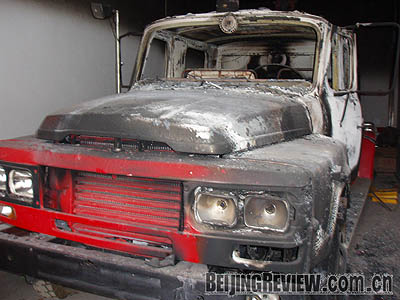|

CHARRED BLACK: The only fire truck in Maqu County burned out during the riots
FENG JIANHUA
Maqu, a small town in northwest China, was quiet on April 10, but walking along the main street the turmoil of earlier days when riots erupted was obvious.
Wangqing, a 53-year-old Tibetan, was a victim of the riot. He recalled how on the evening of March 16, as he sold crafts, the street suddenly burst into chaos when a crowd began damaging property and setting fires. Concerned for his safety, he immediately packed up and returned home.
The riot affected the lives of people living in the town in many ways, according to him. "The number of people coming to the town has obviously decreased," he said. "Before the riot, I could earn at least 30 yuan ($4.2) per day, but now I can only earn a bit more than 10 yuan ($1.4), sometimes I can only get 5 yuan ($0.7)."
Maqu lies in the Gannan Tibetan Autonomous Prefecture of Gansu Province and is at the juncture of three provinces: Gansu, Qinghai and Sichuan. It has a population of around 50,000, of which 86 percent are Tibetans. Following violence in Lhasa on March 14, six counties in the Gannan Tibetan Autonomous Prefecture also witnessed a series of riots.
"There are a lot of transient people in Maqu County, which makes it more difficult to maintain the public security," said Wan Daike, Deputy Magistrate of Maqu County.
According to Wan, the riot on March 16 lasted for about two hours and stopped at around 8 p.m. The targets of the riot included Party and government organs, communication facilities and shops. In total, 261 out of 927 shops were damaged, 110 seriously. According to Wan, less than 100 of the 1,600 monks in Maqu County took part in the riots.
Bricks and swords
Shortly after the riot started, more than 200 rioters gathered in the small square in front of the 110 (China's police hotline) command center building, in which 10 policemen were on duty. Some rioters attacked the building with sticks, bricks and swords, and then set a fire. Five police cars and a fire truck were destroyed. The 10 policemen had to jump over 10 meters from a back window of the building to escape, according to Wan.
Wan said there are around 80 policemen in Maqu County, split between villages. Due to the low number of policemen it was very hard to control the situation by force. Altogether 12 policemen were injured in the riots, he added.
Cecheng Jiancuo is a young monk in Maqu County. He came to Maqu's Tibetan Medicine Hospital to learn Tibetan medicine eight months ago. On March 16, as he was on his way home, he saw a group of people beating a policeman and ran to his aid. "I can't remember the face of the policeman, but his face was bleeding and my robe was also scattered by many knife-cut scars," he said.
"I didn't know the situation much. I believe that most monks would do the same," he added.
Burned to an empty shell
Forty-three-year-old Xin Zilong grew up in Maqu County. After being laid off several years ago he began to rent a three-story building and went into the firework business.
When the riot started on March 16, Xin was minding the shop alone. He quickly closed the doors of the shop and hid in the bathroom on the first floor. Rioters set fire to the shop, which was burned to an empty shell.
"I lost more than 1 million yuan ($143,000), and can only stay with my relatives now," said Xin, standing in front of his ruined business.
Altogether six private shops were destroyed during the riot. The shop owners, like Xin, lost everything. The local government is counting the total loss to the shop owners and will work out a reasonable compensation plan and various preferential policies to support them if they want to restart business.
Xin wants to restart the business as soon as possible. Talking about the future, he said, "I really don't want this kind of incident to happen again." | 